Guillermo de Osma: una página de España en Oxford
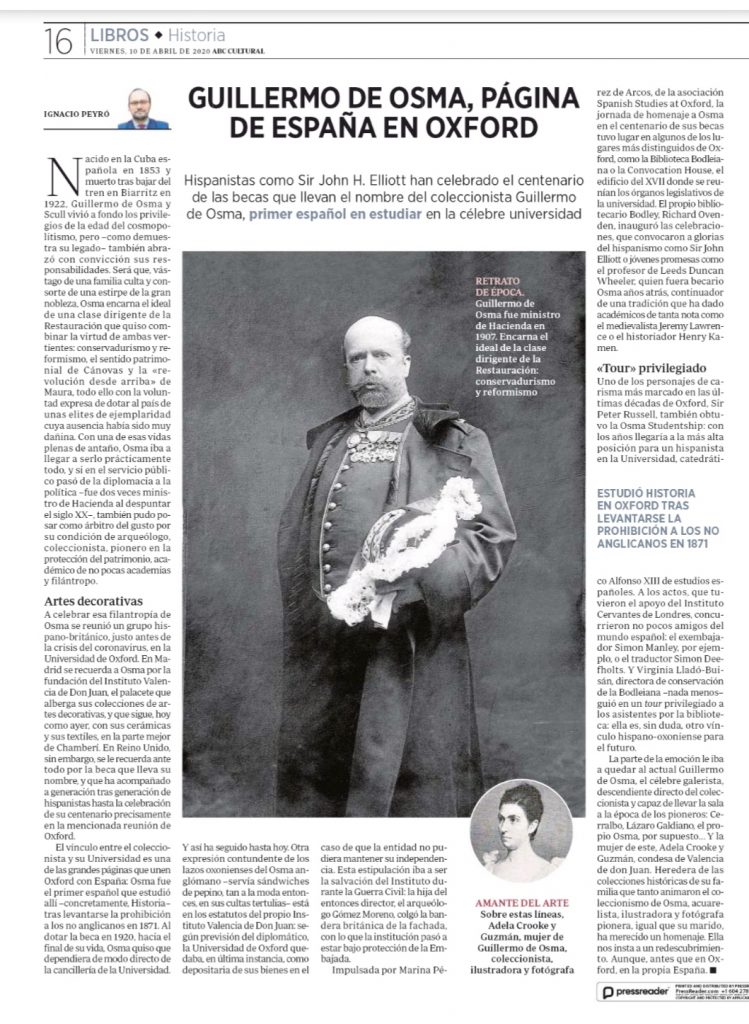
Hispanistas como Sir John Elliott han celebrado en Oxford el centenario de las becas del coleccionista Guillermo de Osma, primer español en estudiar en la célebre Universidad tras permitirse el acceso a católicos en 1871.
Ignacio Peyró, director del Instituto Cervantes de Londres.
Nacido en la Cuba española en 1853 y muerto tras bajar del tren en Biarritz en 1922, Guillermo de Osma y Scull vivió a fondo los privilegios de la edad del cosmopolitismo pero -como demuestra su legado- también abrazó con convicción sus responsabilidades. Será que, vástago de una familia culta y consorte de una estirpe de la gran nobleza, Osma encarna el ideal de una clase dirigente de la Restauración que quiso combinar la virtud de ambas vertientes: conservadurismo y reformismo, el sentido patrimonial de Cánovas y la “revolución desde arriba” de Maura, todo ello con la voluntad expresa de dotar al país de unas elites de ejemplaridad cuya ausencia había sido muy dañina. Con una de esas vidas plenas de antaño, Osma iba a llegar a serlo prácticamente todo, y si en el servicio público pasó de la diplomacia a la política -fue dos veces ministro de Hacienda al despuntar el siglo XX-, también pudo posar como árbitro del gusto por su condición de arqueólogo, coleccionista, pionero en la protección del patrimonio, académico de no pocas academias y filántropo.
A celebrar esa filantropía de Osma se reunió un grupo hispano-británico, justo antes de la crisis del coronavirus, en la Universidad de Oxford. En Madrid se recuerda a Osma por la fundación del Instituto Valencia de Don Juan, el palacete que alberga sus colecciones de artes decorativas y que sigue, hoy como ayer, con sus cerámicas y sus textiles, en la parte mejor de Chamberí. En Reino Unido, sin embargo, se le recuerda ante todo por la beca que lleva su nombre, y que ha acompañado a generación tras generación de hispanistas hasta la celebración de su centenario precisamente en la mencionada reunión de Oxford.
El vínculo entre el coleccionista y su Universidad es una de las grandes páginas que unen a Oxford con España: Osma fue el primer español que estudió allí -concretamente, Historia- tras levantarse la prohibición a los no anglicanos en 1871. Al dotar la beca en 1920, hacia el final de su vida, Osma quiso que dependiera de modo directo de la cancillería de la Universidad. Y así ha seguido hasta hoy. Otra expresión contundente de los lazos oxonienses del Osma anglómano -servía sándwiches de pepino, tan a la moda entonces, en sus cultas tertulias- está en los estatutos del propio Instituto Valencia de Don Juan: según previsión del diplomático, la Universidad de Oxford quedaba, en última instancia, como depositaria de sus bienes en el caso de que la entidad no pudiera mantener su independencia. Esta estipulación iba a ser la salvación del Instituto durante la Guerra Civil: la hija del entonces director, el arqueólogo Gómez Moreno, colgó la bandera británica de la fachada, con lo que la institución pasó a estar bajo protección de la Embajada.
Impulsada por Marina Pérez de Arcos, de la asociación Spanish Studies at Oxford, la jornada de homenaje a Osma en el centenario de sus becas tuvo lugar en algunos de los lugares más distinguidos de Oxford, como la Biblioteca Bodleiana o Convocation House, el edificio del XVII donde se reunían los órganos legislativos de la universidad. El propio bibliotecario Bodley, Richard Ovenden, inauguró las celebraciones, que convocaron a glorias del hispanismo como Sir John Elliott o jóvenes promesas como el profesor de Leeds Duncan Wheeler, quien fuera becario Osma años atrás, continuador de una tradición que ha dado académicos de tanta nota como el medievalista Jeremy Lawrence o el historiador Henry Kamen. Uno de los personajes de carisma más marcado en las últimas décadas de Oxford, Sir Peter Russell, también obtuvo la Osma Studentship: con los años llegaría a la más alta posición para un hispanista en la Universidad, catedrático Alfonso XIII de estudios españoles. A los actos, que tuvieron el apoyo del Instituto Cervantes de Londres, concurrieron no pocos amigos del mundo español: el exembajador Simon Manley, por ejemplo, o el traductor Simon Deefholts. Y Virginia Lladó-Buisán, directora de conservación de la Bodleiana -nada menos- guio en un tour privilegiado a los asistentes por la biblioteca: ella es, sin duda, otro vínculo hispano-oxoniense para el futuro.
La parte de la emoción le iba a quedar al actual Guillermo de Osma, el célebre galerista, descendiente directo del coleccionista y capaz de llevar a la sala a la época de los pioneros: Cerralbo, Lázaro Galdiano, el propio Osma, por supuesto… y la mujer de este, Adela Crooke y Guzmán, condesa de Valencia de don Juan. Heredera de las colecciones históricas de su familia que tanto animaron el coleccionismo de Osma, acuarelista, ilustradora y fotógrafa pionera, igual que su marido ha merecido un homenaje, ella nos insta a un redescubrimiento. Aunque, antes que en Oxford, en la propia España.
«British architects have great respect for the Spanish and the knowledge they bring to their practices»
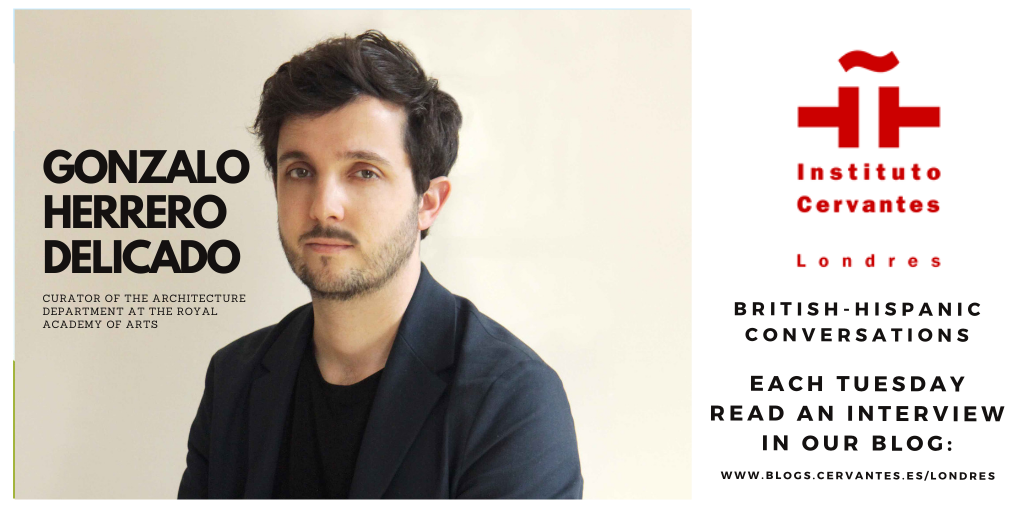
This week, we continue a series of interviews with personalities from the Spanish-British sphere. Our third guest, Gonzalo Herrero Delicado, is an architect, curator and writer based in London. He is Curator of the Architecture Department at the Royal Academy of Arts (RA) where he works on a wide range of projects including exhibitions, displays and talks around architecture and its connection to wider visual arts, technology and design.
Herrero Delicado curated the opening programme for RA’s Architecture Studio Invisible Landscapes (2018-2019), a series of commissioned installations exploring how digital technologies are transforming our everyday lives and environments. Furthermore, last year he worked on a major show titled Eco-Visionaries, exploring the ecological impact of human action on the environment through modern art, architecture and design practices.
Previously, Herrero Delicado held other curatorial positions at The Architecture Foundation and the Design Museum, both in London. At The Architecture Foundation he was the curator of the institution’s public programme which included the Architecture on Film, organised in partnership with the Barbican. At The Design Museum, he managed the curation of a number of commissioned installations as part of the museum’s opening exhibition Fear and Love: Reactions to a Complex World (2016-2017).
As an architect, he worked for several practices, amongst them Lacaton & Vassal Architectes in Paris.

– You have been at the Royal Academy of Arts for almost four years, how do you find it balances with your life?
The balance is very positive and enriching, although it comes with lots of work. My university training is as an architect, and it was through practice that I trained as a curator. I studied at the University of Alicante where the training was very extensive, as well as the range of references that we handled. It was a very humanistic training that made me understand the complexity of architecture and its intimate connection with other disciplines. However, the job of curator involves many other skills that I had to learn on my own. I started as a curator of public programs at The Architecture Foundation in London. Afterwards, I went through the Design Museum and now the Royal Academy. I have gradually focused on exhibitions, which has allowed me to learn about museography little by little as well as organisation and management of exhibitions, conservation, loans, interpretation and everything that goes with being a curator in a museum.
The gradual advance in the scale and complexity of the institutions has also been very positive in this training. I organised my first exhibition on my own as a curator, editor and designer. A great leap compared to the almost 500 people who work directly and indirectly at the Royal Academy. Even so, the feeling is very familiar and we all know each other by name, which makes work and the day-to-day much easier.

– How did Eco-Visionaries, the last exhibition you curated, come about?
Eco-Visionaries was the result of a collaboration with several European museums, including Laboral in Gijón and Matadero in Madrid. A transnational exhibition that explored how artists, architects and designers are reflecting on climate change to propose alternative ways of relating between humans and the environment. Eco-Visionaries has been a great opportunity for both the museum and me personally. When I did the interview for this position, I presented a proposal on the anthropocene, and four years later I was able to organise this exhibition – together with Mariana Pestana and Pedro Gadanho. Eco-Visionaries sought to make the public reflect on the impact of our lives in the current environmental crisis. It is something that interests me a lot as a curator, making people reflect on the aspects of our life and the world around us that would otherwise go unnoticed.
– What did this exhibition mean and what impact did it have on you?
Eco-Visionaries attracted the youngest audience out of our exhibitions in recent years and that is tremendously important, particularly when it comes to climate change. It has also been an occasion to redefine our sustainability strategy and generate procedures with a lower environmental impact, something that we want to implement throughout our future program. Regarding this topic, there is still a lot to do. It continues to be an important part of my agenda, either giving talks or collaborating with different projects and foundations such as The Royal Foundation of the Dukes of Cambridge, whom I currently advise with the Earthshot Prize, which is considered the most prestigious award in environmental matters.

– You were 27 years old when you came to London and started working as a curator. How has this experience in the British capital been?
I love London. It is a city in continuous movement and has a frenetic rhythm with events and cultural plans every afternoon of the week. That’s something you can’t find in many other cities. It is something that hooks me, although sometimes it can be exhausting and I understand that it does not work for everyone. Many people come and go in this city, they do not just connect with it and prefer to live in smaller and more relaxed cities. I think that if you do not know how to make the most of the opportunities that the city offers, it is better to look elsewhere, but London can be very demanding and end up devouring you.
– The coronavirus crisis has stopped everything, but what projects are you working on that you can tell us about?
This moment is truly unique. I have had many years without having the time to dedicate myself to research and write. I am taking advantage of this time to advance various projects both inside and outside the Royal Academy. These are very eclectic in both format and theme, ranging from architecture to technology, fashion, and climate change. For example, I have spent several years researching how virtual technologies are transforming architecture and art. In 2017, I started with the Invisible Landscapes project that lasted almost a year and gave rise to a series of installations, a debate program and even a short film in virtual reality. Now I am interested in continuing this exploration and addressing how digital technologies, from social networks to biometrics, are altering and redefining the conventions of our human appreciation of beauty and the spaces dedicated to it.

– What impact does Spanish architecture have in the United Kingdom and vice versa?
In London and the United Kingdom, in general, there are many Spanish architects who work in the main studios. Some also have established their own offices here. The crisis in Spain between 2008 and 2014 had a strong impact. Specially on the real estate sector and therefore, on architects and many of them decided to settle here. English architects have great respect for the Spanish and the knowledge they bring to their practices. Likewise, many others have decided to dedicate themselves to teaching and, in practically all universities with architecture studies, you can find Spanish teachers.
– Most of our readers are Spanish students. Is Spanish spoken at the Royal Academy? And to what extent in the architectural sector?
There are several Spaniards in the Royal Academy, especially in the exhibition department. There are always conversations in Spanish in the hallways and we even had a potato omelette contest. The Royal Academy has always had a connection and appreciation for Spain throughout its history. For example, in 1920 there was an exhibition dedicated to Spanish painting with works by El Greco, Velázquez, Zurbarán and Goya among others, and whose selection was made by a committee chaired by the Duke of Alba. More recently we have had other exhibitions with Spanish artists such as Dalí / Duchamp (2017-2018) and Picasso and Paper (2020). Regarding architecture, one of the last collaborations with Spanish architects was the installation of Home (Act I) with the Barcelona studio MAIO which I curated as part of the Invisible Landscapes project that the Architecture Studio inaugurated and which is currently part of an exhibition in Matadero in Madrid. Additionally, we even had a Honorary Royal Academician, the Spanish architect Josep Lluís Sert.

– As an architect, what recommendations do you make for everyone who visits or even lives in London?
Without a doubt, a key visit is the house-museum of the neoclassical architect Sir John Soane in Bloomsbury, which keeps his incredible collection of drawings, paintings and antiques. Nearby is the Barbican, one of the most spectacular brutalist residential complexes built after the war. Another project that I always recommend to any architect who visits the city is the Snowdon Aviary at the London Zoo, one of the few buildings still standing by the visionary Cedric Price, and that can be seen perfectly from the canal without paying the entrance.
“Los arquitectos británicos tienen mucho respeto por los españoles y el conocimiento que aportan a sus estudios”
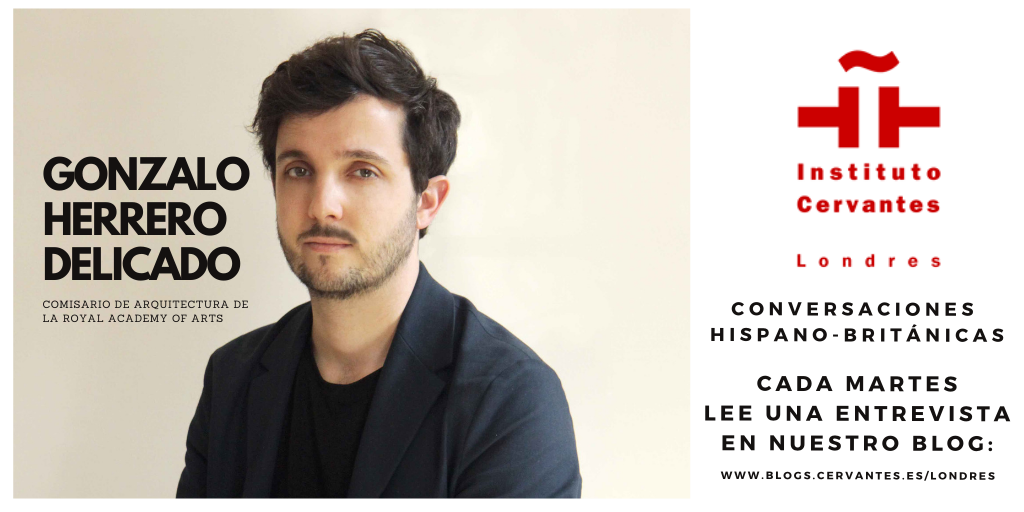
Esta semana continuamos una serie de entrevistas con personalidades de la esfera hispano-británica. Nuestro tercer invitado, Gonzalo Herrero Delicado, es arquitecto, comisario y escritor radicado en Londres. Actualmente es Comisario de Arquitectura de la Royal Academy of Arts (RA) desde donde desarrolla un amplio número de proyectos que incluyen exposiciones, instalaciones y programas públicos en la intersección entre arquitectura y las artes visuales.
Herrero Delicado fue el comisario del programa de exposiciones Invisible Landscapes (2018-2019) que inauguró el nuevo Architecture Studio y exploraba el impacto de las tecnologías digitales en nuestras vidas y entornos cercanos. Además, el año pasado trabajó en la exposición titulada Eco-Visionaries, sobre el impacto ecológico de la acción humana en el medio ambiente a través de prácticas contemporáneas en arte, arquitectura y diseño.
Previamente, Herrero Delicado trabajó como comisario en distintas instituciones, entre ellas The Architecture Foundation y el Design Museum, ambos en Londres. Fue comisario de programas públicos en The Architecture Foundation donde comisarió el programa Architecture on Film organizado junto al Barbican. Con el Design Museum se encargó del comisariado de distintas instalaciones ad-hoc para la exposición Fear and Love: Reactions to a Complex World (2016-2017) que inauguró el museo.
Como arquitecto, Herrero Delicado ha trabajado para distintos estudios internacionales, entre los que destaca Lacaton & Vassal Architectes en París.

(c) Agnese Sanvito
– Lleva casi cuatro años en la Royal Academy of Arts, ¿qué balance hace?
El balance es muy positivo y enriquecedor, aunque no falto de mucho trabajo. Mi formación universitaria es como arquitecto, y fue a través de la práctica que me formé como comisario. Estudié en la Universidad de Alicante donde la formación era muy amplia, así como el abanico de referencias que manejábamos. Fue una formación muy humanística que me hizo entender la complejidad de la arquitectura y su íntima conexión con otras disciplinas. Sin embargo, el trabajo de comisario implica muchos otros conocimientos que tuve que aprender por mi cuenta. Empecé como comisario de programas públicos en The Architecture Foundation en Londres y tras pasar por el Design Museum y ahora la Royal Academy, he ido gradualmente centrándome en exposiciones, lo que me ha permitido aprender poco a poco sobre museografía, organización y gestión de exposiciones, conservación, préstamos, interpretación y todo lo que conlleva ser comisario en un museo.
El avance gradual en la escala y complejidad de las instituciones también ha sido muy positivo en esta formación. Mi primera exposición la organicé por mi cuenta haciendo de comisario, montador y diseñador. Un gran salto comparado con las casi 500 personas que trabajan directa e indirectamente en la Royal Academy. Aun así la sensación es muy familiar y todos nos conocemos por el nombre, lo cual facilita mucho el trabajo y el día a día.

– ¿Cómo surgió Eco-Visionaries, la última exposición que ha comisariado?
Eco-Visionaries fue el resultado de una colaboración con varios museos europeos, entre los que se incluyen Laboral en Gijón y Matadero en Madrid. Una muestra transnacional que exploraba cómo artistas, arquitectos y diseñadores están reflexionando sobre el cambio climático para proponer modos alternativos de relación entre los humanos y el medio ambiente. Eco-Visionaries ha supuesto una gran oportunidad tanto para el museo como para mi personalmente. Cuando hice la entrevista para este puesto presente una propuesta sobre el antropoceno, y cuatro años después he podido organizar esta exposición – junto a Mariana Pestana y Pedro Gadanho -. Eco-Visionaries buscaba hacer reflexionar al público sobre el impacto de nuestras vidas en la actual crisis medioambiental. Eso es algo que me interesa mucho como comisario, hacer reflexionar a la gente sobre aspectos de nuestra vida y el mundo que nos rodea que de otra manera pasarían desapercibidos.
– ¿Qué significó y qué impacto tuvo para usted esta exposición?
Eco-Visionaries ha sido una de las exposiciones con más visitantes jóvenes de los últimos años y eso es tremendamente importante, en particular cuando hablamos de cambio climático. Ha sido también una ocasión para redefinir nuestra estrategia de sostenibilidad y generar exposiciones con un menor impacto medioambiental, algo que queremos implantar en todo nuestro futuro programa. En cuanto a este tema aún queda muchísimo por hacer. Sigue siendo una parte importante de mi agenda, ya sea dando charlas o colaborando con diferentes proyectos y fundaciones como The Royal Foundation de los Duques de Cambridge, a quienes actualmente asesoro con el Earthshot Prize, el cual está considerado el premio más prestigioso en materia medioambiental.

– Tenía 27 años cuando llegó a Londres y empezó a trabajar como comisario, ¿cómo está siendo esta experiencia en la capital británica?
Londres me encanta. Es una ciudad en continuo movimiento y tiene un ritmo frenético con eventos y planes culturales todas las tardes de la semana. Eso es algo que no puedes encontrar en muchas otras ciudades. Eso es algo que a mi me engancha, aunque a veces puede ser agotador y entiendo que no funcione para todo el mundo. Mucha gente va y viene en esta ciudad, no acaban de conectar con ella y prefieren vivir en ciudades más pequeñas y relajadas. Creo que si no sabes exprimir y aprovechar al máximo las oportunidades que ofrece la ciudad, es mejor buscar otro sitio, sino Londres puede ser muy exigente y acabar devorándote.
– El coronavirus ha parado todo, pero ¿en qué proyectos está trabajando que nos pueda adelantar?
Este momento es realmente único. Llevaba muchos años sin tener tiempo para dedicarme a investigar y escribir. Estoy aprovechando este tiempo para avanzar varios proyectos tanto dentro y fuera de la Royal Academy. Estos son muy eclécticos tanto en formato como en temática y van desde arquitectura a tecnología, moda o cambio climático. Por ejemplo, llevo varios años investigando sobre como las tecnologías virtuales están transformando la arquitectura y el arte. En 2017 comencé con el proyecto Invisible Landscapes que duró casi un año y dió pie a una serie de instalaciones, un programa de debates e incluso un corto en realidad virtual. Ahora me interesa seguir esa exploración y abordar cómo las tecnologías digitales, desde redes sociales a biometría, están alterando y redefiniendo las convenciones de la belleza humana y los espacios dedicados a ella.

– ¿Qué impacto tiene la arquitectura española en Reino Unido y viceversa?
En Londres y el Reino Unido en general viven muchísimos arquitectos españoles que trabajan en los principales estudios del país y algunos también han establecido aquí sus oficinas propias. La crisis en España entre 2008 y 2014 tuvo un fuerte impacto sobre todo en el sector inmobiliario y por tanto en arquitectos, los cuales muchos de ellos decidieron establecerse aquí. Los arquitectos ingleses tienen mucho respeto por los españoles y el conocimiento que aportan a sus estudios. Así mismo, muchos otros han decidido dedicarse a la docencia y en prácticamente todas las universidades con estudios de arquitectura se pueden encontrar docentes españoles.
– La mayoría de nuestros lectores son estudiantes de español. ¿Se habla español en la Royal Academy? ¿Y hasta qué punto en el sector arquitectónico?
Somos varios españoles en la Royal Academy, sobre todo en el departamento de exposiciones. Siempre hay conversaciones en español en los pasillos y hasta hemos tenido algún concurso de tortilla de patata. La Royal Academy siempre ha tenido una conexión y apreciación por España a lo largo de su historia. Por ejemplo, en 1920 hubo una exposición dedicada a la pintura española con obras de El Greco, Velázquez, Zurbarán y Goya entre otros, y cuya selección fue realizada por un comité presidido por el entonces Duque de Alba. Más recientemente hemos tenido otras exposiciones con artistas españoles como Dalí / Duchamp (2017-2018) y Picasso and Paper (2020). En cuanto a arquitectura, una de las últimas colaboraciones con arquitectos españoles fue la instalación que Home (Act I) del estudio barcelonés MAIO que comisarié como parte del proyecto Invisible Landscapes que inauguró el Architecture Studio y que actualmente forma parte de una exposición en Matadero en Madrid. Además, incluso tuvimos un Honorary Royal Academician, el arquitecto español Josep Lluís Sert.

– Como arquitecto, ¿qué recomendaciones hace para todo aquel que visita o vive en Londres?
Sin duda una visita clave es la casa-museo del arquitecto neoclásico Sir John Soane en Bloomsbury que alberga su increíble colección de dibujos, pinturas y antigüedades. Muy cerca está el Barbican, uno de los complejos residenciales brutalistas más espectaculares construidos después de la guerra. Otro de los proyectos que recomiendo siempre a cualquier arquitecto que visita la ciudad es el Snowdon Aviary en el London Zoo, una de las pocas construcciones que siguen en pie del visionario Cedric Price, y que se puede ver perfectamente desde el canal sin necesidad de pagar la entrada.
Our culture will run freely to build a better society…
As it’s right and proper,
Instituto Cervantes is working with
the minimum number of members of staff.
We do not neglect ourselves,
we take care of ourselves.
Our offices do not have the
hectic of normal days;
our Caja de las Letras
misses its visitors:
our auditorium bites its tongue,
it does nott speak about
culture in Spanish,
Catalan, Basque or Galician.
Our centres fulfill their duty
with discipline
the security measures
of each country.
But people from Cervantes
work from their homes,
spread around the world,
and it’s being a long time
since we work online too.
We defend our languages,
we take take of ourselves
in our languages.
And sooner rather than later,
we are sure that
the great groves will be opened,
and our culture will run freely
to build a better society.
And our offices,
our centres,
will be moved
again by words and phones,
paper noises,
keyboards and works.
And our Caja de las Letras
will receive again
the visit of those who search
the legacy of their elders.
And our auditoriums
will be filled with people.
Under the identity
of a language
that has made us free
and for the one we bet on
together,
fearless,
as a task
of democratic seduction.
Words by Instituto Cervantes Director, Luis García Montero
«Hemos sobrevivido a las guerras y vamos a superar COVID19»

Esta semana continuamos una serie de entrevistas con personalidades de la esfera hispano-británica. Nuestro segundo invitado, Jimmy Burns Marañón, es el presidente de la BritishSpanish Society desde marzo de 2013. Nos habla sobre el trabajo y las actividades realizadas por esta organización benéfica, su experiencia periodística o su admiración por su difunto abuelo, el Dr. Gregorio Marañón.
Nacido en Madrid en 195, de madre española y padre británico, Burns es un periodista que trabajó para el Financial Times durante más de tres décadas (1979 – 2009), periodo durante el cual fue nombrado corresponsal en Lisboa, Madrid y Buenos Aires. Previamente trabajó para este diario como reportero senior en varios campos, incluyendo relaciones laborales, investigaciones especiales, política, delincuencia y seguridad.
Burns es autor de varios libros y es consultor independiente sobre España y América Latina. Ha sido miembro de la BritishSpanish Society desde sus días universitarios en la década de 1970 y fue nombrado Fiduciario y Vicepresidente en 2009.
Además de la BritishSpanish Society, Jimmy también es cofundador de Friends of Battersea Park; ha sido miembro del Consejo de Administración del Cañada Blanch Centre for Contemporary Spanish Studies(London School of Economics), ex presidente de la Asociación Stonyhurst y director no ejecutivo de The Tablet Publishing Company.
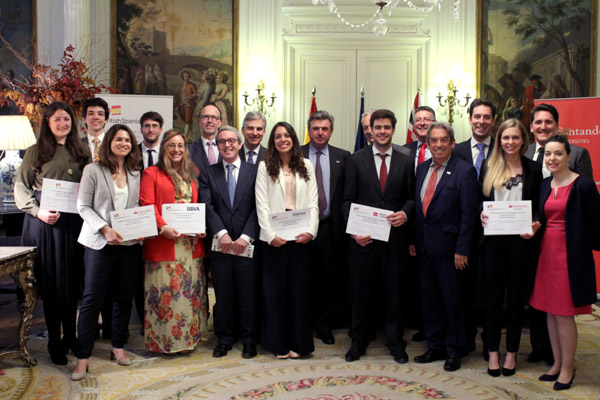
Usted es el presidente de la BritishSpanish Society desde marzo de 2013. ¿Podría contarnos sobre el trabajo que realiza, por favor?
Somos una organización benéfica con sede en Londres, dirigida principalmente por voluntarios con una red de miembros individuales y patrocinadores corporativos e institucionales en el Reino Unido y España. Tenemos una ética y una misión claramente definidas de compromiso y diálogo a través de la cultura y la educación, y promovemos la amistad y el entendimiento entre los pueblos del Reino Unido y España. Organizamos eventos sociales y culturales, y paneles de discusión, y publicamos una revista trimestral bicultural muy admirada, en línea e impresa. Estamos orgullosos de otorgar becas a estudiantes de postgrado británicos y españoles cada año, gracias a nuestras actividades de recaudación de fondos y la generosidad de nuestros principales patrocinadores, y al hacerlo, esperamos alentar una investigación y aprendizaje valiosos que creemos que serán beneficiosos, tanto para el Reino Unido como para España.
La BritishSpanish Society se fundó en 1916 y, a lo largo de sus más de cien años de historia, ha sobrevivido a guerras, pandemias y otras crisis internacionales y nacionales, y creo que vamos a superar el COVID19.
Soy consciente de los desafíos a los que se enfrentan muchos de nuestros miembros y seguidores, y sus amigos y familiares, muchos de los cuales se han comunicado personalmente conmigo en los últimos días expresando una tristeza y preocupación sinceras.
El BSS atrae la resistencia y la fuerza a través de los principios básicas de solidaridad y buena vecindad. Estos son tiempos desafiantes en los que podemos redescubrir nuestra humanidad, haciendo todo lo necesario para proteger a los más vulnerables y apoyarnos mutuamente para que podamos superar esto juntos.
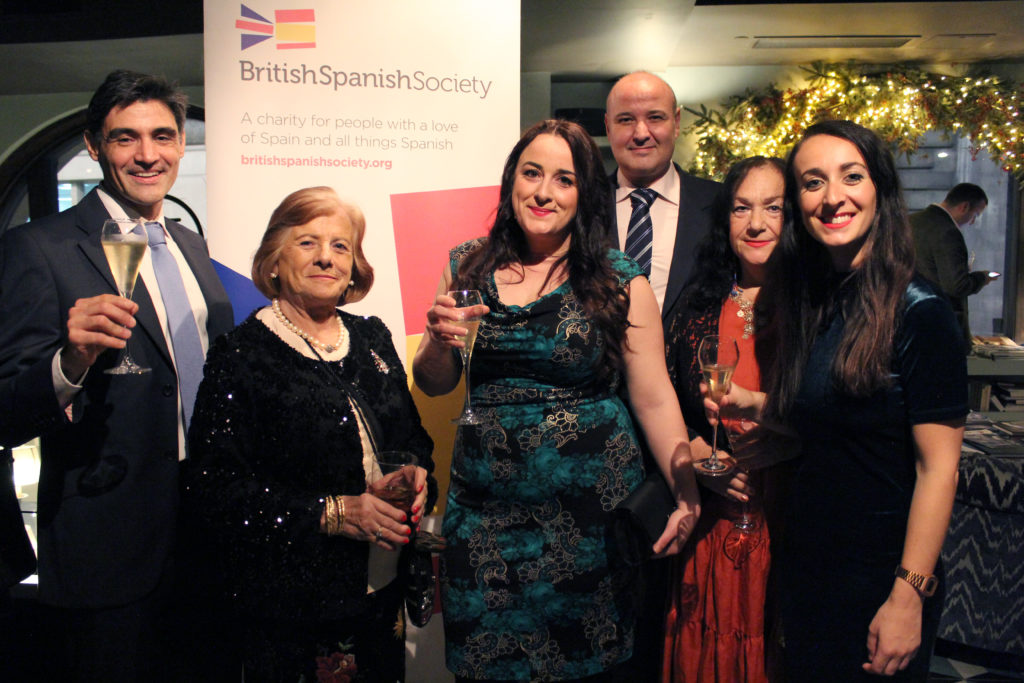
¿Qué eventos organizas cada año?
Nuestro respectivo presidente honorario y vicepresidentes honorarios, el embajador español en Londres y el embajador británico en Madrid reciben anualmente recepciones de la BritishSpanish Society. Nuestra ceremonia anual de entrega de becas también se celebra en la residencia del embajador español en Londres. Otros eventos regulares incluyen nuestra noche musical anual en español, visitas guiadas exclusivas de exhibiciones especiales de arte, mesas redondas y conferencias en el Reino Unido y España sobre temas culturales, históricos y contemporáneos. Con el COVID19 hemos tenido que reorganizarnos y adaptarnos a las circunstancias.
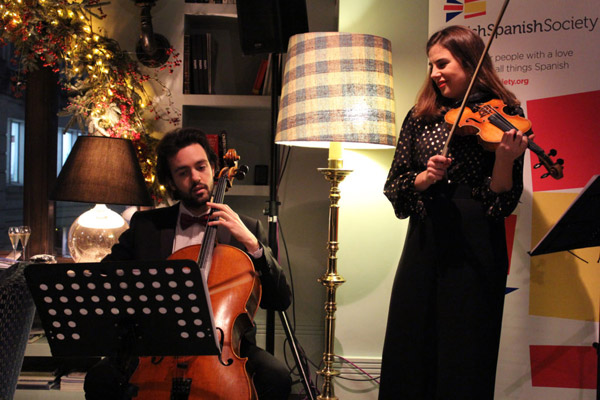
¿Cómo ha afectado la crisis del COVID19 a su actividad?
Dada la naturaleza bicultural de nuestra organización benéfica y también teniendo en cuenta la incertidumbre global y la interrupción causada por el virus, y la prioridad de contener su propagación y proteger a los vulnerables, hemos pospuesto hasta nuevo aviso todos los eventos planificados en el Reino Unido y España
El BSS continúa monitoreando las pautas y protocolos de las diversas autoridades sanitarias y esperamos con ansias el día en que sea seguro reanudar nuestras actividades normales. Por ahora, conscientes de nuestra misión y objetivos, la organización continúa lo mejor que puede para cumplir con sus objetivos. compromisos culturales y educativos, con la selección de los premios de becas de este año y la preparación para el próximo número de nuestra revista trimestral La Revista.
También nos mantenemos en contacto por teléfono y correo electrónico, y nos ponemos en contacto con los miembros y seguidores y aquellos que solo nos están conociendo ahora a través de las noticias de nuestro sitio web y las fuentes diarias de redes sociales que ofrecen elementos que inspiran. El objetivo es que los británicos y los españoles se apoyen mutuamente y se mantengan comprometidos de una manera positiva y constructiva, proporcionando un canal de comunicación y, siempre que sea posible, para levantar el espíritu a través de la música, las artes visuales y la literatura.
Nací en Madrid de madre española y padre británico, he estado a caballo entre culturas toda mi vida y tengo familiares y muchos amigos en ambos países. Me siento a nivel personal y organizacional profundamente afectado por esta crisis. Mis pensamientos están con los vulnerables, los que sufren y los que han muerto tristemente, y sus seres queridos.
La BritishSpanish Society atrae la resistencia y la fuerza a través de las reglas básicas de solidaridad y buena vecindad. Estos son tiempos desafiantes en los que podemos redescubrir nuestra humanidad común.
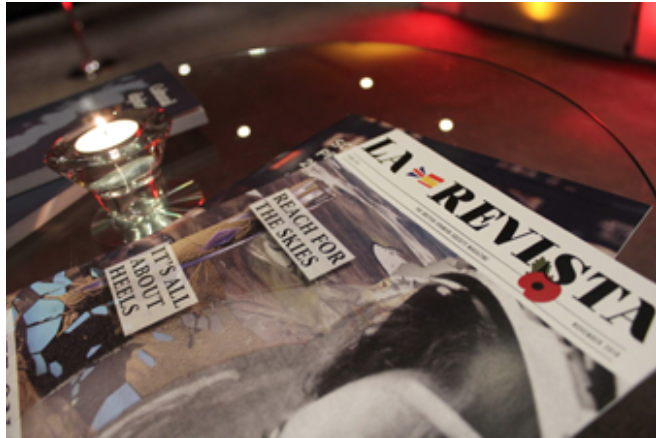
También publican La Revista, la revista insignia de la BritishSpanish Society. ¿Con qué frecuencia lo publicas? ¿Dónde pueden encontrarlo los lectores?
La Revista se publica cuatro veces al año, en otoño, invierno, primavera y verano. Distribuimos copias en nuestros eventos, a nuestros miembros y a nuestros seguidores institucionales y corporativos. Los artículos se destacan en nuestras redes sociales, y la revista también se puede leer en formato digital, incluído nuestro sitio web. www.britishspanishsociety.org
¿Cómo ves las relaciones británico-españolas en el contexto del Brexit?
Si bien compartí la tristeza sincera con las divisiones provocadas por el voto del Brexit con muchos de nuestros miembros y simpatizantes, tengo la firme creencia de que hay mucho más que une a nuestros pueblos y que podemos aprender unos de otros. Brexit significa que Reino Unido, como estado, está abandonando la Unión Europea, sus leyes e instituciones, pero el Reino Unido siempre ha tenido un pie dentro y otro fuera de la UE, y estoy seguro de que el pragmatismo en ambos lados jugará un papel importante en el futuro . Como uno de los patrocinadores de la BritishSpanish Society y ex embajador del Reino Unido en España, Sir Stephen Wright, lo expresó muy bien en un artículo publicado en nuestro sitio web, hay un conjunto más amplio de relaciones que el Brexit no necesita y no debe cambiar. Tal y como escribió él: “Como todos sabemos por nuestras propias vidas y conocidos, hay innumerables instituciones e individuos en la sociedad británica que han forjado asociaciones, acuerdos de colaboración y amistades con otros europeos para perseguir sus intereses, sus medios de vida y sus pasiones. Los campos de tales esfuerzos varían ampliamente en la sociedad. Este es un valioso tejido social de relaciones que se extiende por toda Europa”.
Nadie puede estar seguro de cómo surgirán nuestras relaciones bilaterales de la crisis sanitaria y socioeconómica provocada por la pandemia del coronavirus. El virus no respeta fronteras o nacionalidades, nadie sabe a dónde irá el próximo ataque. Pero me siento alentado por la expresión de la solidaridad humana y la acción desinteresada de los voluntarios y el personal de atención médica y de primera línea que hemos visto en España y el Reino Unido. Es una resistencia compartida en la búsqueda del bien común contra un enemigo común sin rostro e invisible. Así que espero que esta crisis conduzca a un compromiso más enérgico con la conectividad, la cooperación y el apoyo mutuo en nuestras relaciones. A medida que aprendamos las lecciones de esta crisis, recaerá en la sociedad civil, todos nosotros, desde investigadores científicos y médicos, ingenieros y tecnólogos hasta artistas y empresarios, y sí, los voluntarios trabajadores del BSS, para hablar y entregar un mundo mejor y más saludable.
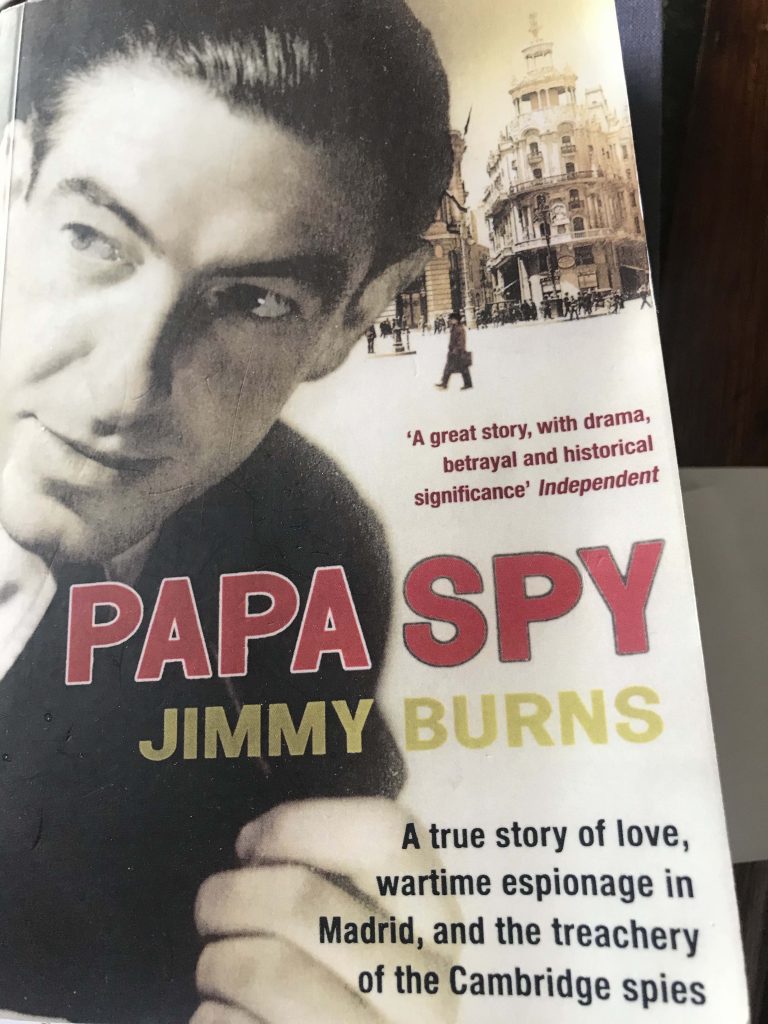
Nacido de una madre española y un padre británico, han pasado casi 10 años desde la publicación de su libro Papa Spy. ¿Podría contarnos un poco más sobre ambos y cómo influyeron en su carrera?
Como escritora, autora y voluntaria, a mi madre Mabel Marañón, quien pasó gran parte de su vida como trabajadora voluntaria ayudando a la comunidad española en Londres, le debo el legado perdurable de mi abuelo materno español, el Dr. Gregorio Marañón. No solo era un médico muy talentoso y afectuoso, sino un liberal y humanista, cuya propia vida era un ejemplo de tolerancia y compromiso cultural. Cuando era niño, me sentí muy cerca de mi abuelo y nunca olvidaré que el 27 de marzo de 1960 mi madre me llevó a su cama el 27 de marzo de 1960 para despedirlo con lágrimas en los ojos cuando murió en nuestra casa familiar en Madrid, y cómo estaba la Avenida Castellana. se llenó de tantas personas de todos los orígenes sociales que lo lloraron cuando pasó su cortejo fúnebre. Marañón tenía algo que valía la pena, incisivo, y a menudo profético, para decir sobre casi todo, desde una dieta saludable hasta el amor y la amistad, desde El Greco hasta la Guerra Civil española. Sus obras completas proporcionan una referencia duradera sobre cómo lidiar con la vida, sus biografías de personajes históricos analizan las complejidades de la condición humana y la política, desde la timidez, la envidia y la sexualidad hasta el poder, la intriga y la traición.
Mi padre, Tom Burns, sirvió a su país en la Segunda Guerra Mundial y de él heredé un respeto duradero por Churchill. Sin olvidar sus defectos y la necesidad de no glorificarlo, siempre he pensado en Churchill en tiempos de grandes crisis, su capacidad de recuperación, su capacidad para iluminar incluso en la hora más oscura. También agradezco a mi padre por mi educación jesuita que me enseñó que estamos llamados a dar lo mejor de nosotros mismos por los demás, y las lecciones que aprendí de él y otros mentores ignacianos sobre la necesidad de ser honesto y valiente como escritor y periodista.
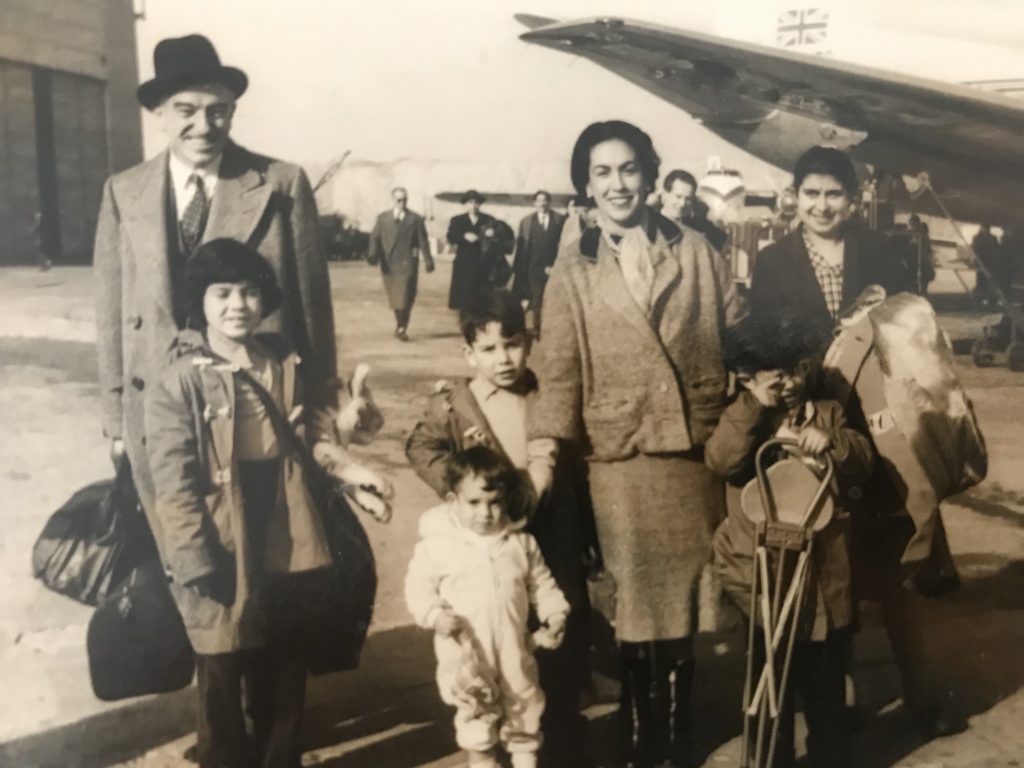
Usted es un autor y periodista anglo-español y escribe un «Diario de Londres». ¿Podría contarnos un poco más sobre otros trabajos en los que esté trabajando en este momento?
Creo que escribir no es solo una llamada, sino una forma de terapia, y llevar un diario me ayuda a estar atento, reflexionar, discernir y, cuando sea necesario, interpretar y responder en tiempos difíciles. Una de las personas que ha tenido una influencia duradera en mí es el recuerdo y el ejemplo de mi difunto abuelo español, el Dr. Gregorio Marañón, que tenía una gran fe en la humanidad. Recomiendo a quienes aún no lo hayan visto el maravilloso documental que TVE produjo sobre su vida ejemplar. Recuerdo haberlo mostrado en un evento conjunto del panel de la BritishSpanish Society y el Instituto Cervantes en Londres hace unos años. La cadena de televisión TVE 2 lo mostró recientemente como parte de su campaña ‘Quedate en Casa’ durante la crisis de COVID19 y se puede encontrar en este enlace.
También estoy tratando de usar el tiempo en casa para realizar algunos proyectos de libros nuevos sin terminar, incluida una biografía de un amigo de mi padre que era espía en la Segunda Guerra Mundial y una novela sobre la Guerra Civil española en un pequeño pueblo de pescadores, y estoy plantando unas pocas de semillas de lechuga y de espinacas en nuestro jardín del patio porque escribir es parte de la vida y la supervivencia.
«We have survived wars and we shall pull through COVID19»

This week we continue a series of interviews with personalities from the Spanish-British sphere. Our second guest, Jimmy Burns Marañon, is the chairman of the BritishSpanish Society since March 2013. He tells us about the work and activities run by this charity, his journalism experience or his admiration for his late grandfather Dr Gregorio Marañon.
Born in Madrid in 1953 to a Spanish mother and British father, Burns is a journalist who worked for the Financial Times for over three decades (1979 – 2009), during which he was posted as a foreign correspondent in Lisbon, Madrid and Buenos Aires before working for the newspaper as a senior reporter in a number of fields including industrial relations, special investigations, politics, crime and security.
Burns is the author of several books and is an independent consultant on Spain and Latin America. He has been a member of the BritishSpanish Society since his university days in the 1970s and was appointed as Trustee and Vice-Chairman in 2009.
Aside from the BritishSpanish Society, Jimmy is also the Co-Founder of Friends of Battersea Park; has served as a member of the Management Council of Cañada Blanch Centre for Contemporary Spanish Studies (London School of Economics), as former President of the Stonyhurst Association and Non-Executive Director of The Tablet Publishing Company.
The Instituto de Cervantes in London actively supports the work of the BritishSpanish Society.

You are the Chairman of the BritishSpanish Society since March 2013. Could you tell us about the work you do, please?
We are a London based charity mainly run by volunteers with a network of individual members and corporate and institutional supporters in the UK and Spain . We have a clearly defined ethos and mission of engagement and dialogue through culture and education, and promoting friendship and understanding between the peoples of the UK and Spain. We organize social and cultural events, and panel discussions, and publish a very admired bi-cultural quarterly magazine online and in print. We are proud to award scholarships and bursaries to British and Spanish post-graduate students every year, thanks to our fund-raising activities and the generosity of our principal supporters, and in doing so we hope to encourage valuable research and learning which we believe to be beneficial for both the UK and Spain.
The BritishSpanish Society was founded in 1916 and through its more than hundred year history has survived wars, pandemics, and other international and national crises, and I believe we shall pull through COVID19.
I am aware of the challenging existence facing many of our members and supporters, and their friends and families, many of whom have communicated with me personally in recent days expressing a heartfelt sadness and worry.
The BSS draws resilience and strength through the basic rules of solidarity and good neighbourliness. These are challenging times in which we can rediscover our common humanity in doing what we need to do all that is necessary to protect the more vulnerable, and support each other so we can pull through this together.

What events do you organize every year?
Our respective honorary president and honorary vice presidents, the Spanish Ambassador in London and the British Ambassador in Madrid annually host BritishSpanish Society receptions. Our annual scholarship awards ceremony is also held at the Spanish ambassador’s residence in London. Other regular events range include our annual Spanish musical evening, exclusive guided tours of special art exhibitions, panel discussions and conferences in the UK and Spain on cultural , historic and contemporary. With the COVID19 we have had to reorganize and adapt to the circumstances.

How has the COVID19 crisis affected your activity?
Given the bi-cultural nature of our charity and also mindful of the global uncertainty and disruption caused by the virus, and the priority of containing its spread and protecting the vulnerable, we have postponed until further notice all planned events in the UK and Spain.
The BSS continues monitoring the guidelines and protocols from the varied health authorities and we are looking forward to the day when it is safe to resume our normal activities For now, mindful of our mission and objectives, the charity continues as best it can to meet its cultural and educational commitments, with the selection of this year’s scholarship awards, and preparation for the next issue of our quarterly magazine La Revista.
We also keep in touch by phone and email, and reaching out to members and supporters and those who only are getting to know us now through our website news and daily social media feeds offering items that inspire. The aim is to have British and Spanish support each other, and keep engaged in a positive and constructive way providing a channel of communication and whenever possible to lift spirits through music, visual arts and literature.
I was born in Madrid from a Spanish mother and a British father have been straddling cultures all my life , and have family members and many friends in both countries. I feel at a personal as well as organisational level deeply affected by this crisis. My thoughts are with the vulnerable, those suffering, and those who have sadly died, and their loved ones.
The BritishSpanishSociety draws resilience and strength through the basic rules of solidarity and good neighbourliness. These are challenging times in which we can rediscover our common humanity.

You also publish La Revista, the British Spanish Society’s flagship magazine. How often do you publish it? Where can readers find it?
La Revista is published four times a year, with autumn, winter, spring and summer. We distribute copies at our events, to our members and our institutional and corporate supporters. Articles are highlighted on our social media feeds, and the magazine is also readable in digital form,including on our website. www.britishspanishsociety.org.
How do you see British-Spanish relations in the context of Brexit?
While I shared the heartfelt sadness with the divisions provoked by the Brexit vote with many of our members and supporters, I have an enduring belief that there is much more that unites our peoples , and that we can learn from each other. Brexit means that Britain as a state is leaving the European Union, its laws and its institutions but the UK has always had one foot in and one foot out of the EU, and I am sure pragmatism on both sides will play an important part going forward. As one of the BritishSpanish Society patrons and former UK ambassador to Spain Sir Stephen Wright, has put it so well in an article published on our website, there is a wider set of relationships that Brexit need not and should not change. As he wrote “As we all know from our own lives and acquaintances, there are countless institutions and individuals in British society that have forged partnerships, collaborative arrangements and friendships with other Europeans to pursue their interests, their livelihoods and their passions. The fields of such endeavours range widely across society. This is a valuable social fabric of relationships that stretches across Europe.”
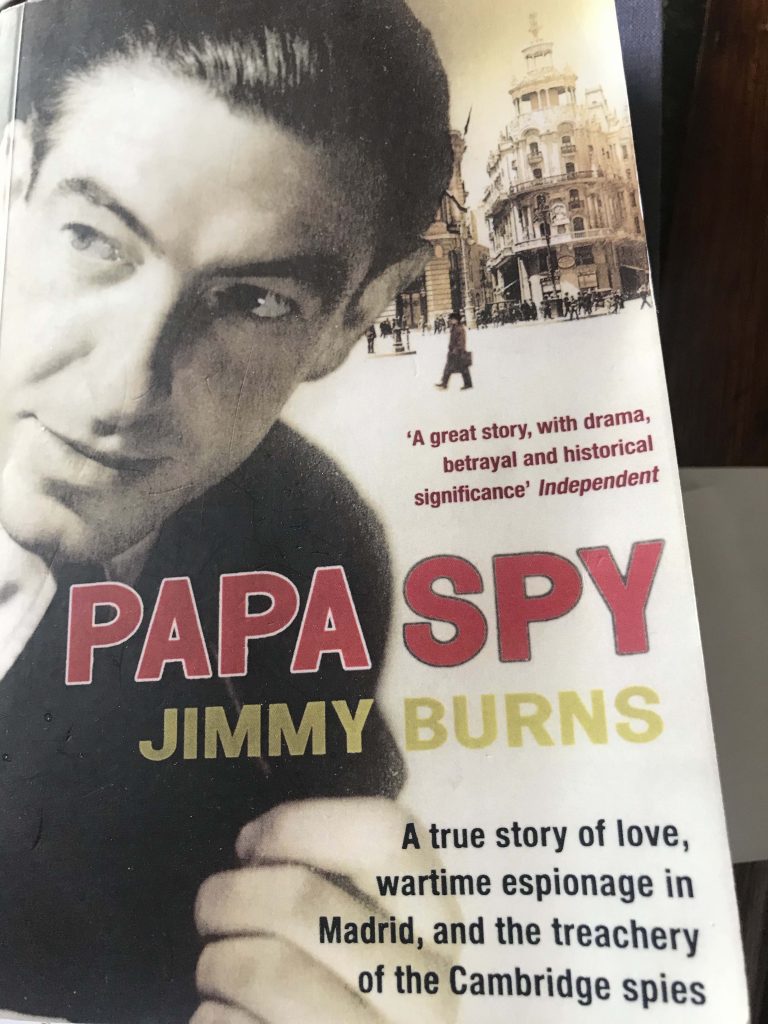
None can be certain how our bilateral relations will emerge from the health and socio-economic crisis provoked by the Corona Virus pandemic . The virus doesn’t respect frontiers or nationalities, no one known where it is going attack next. But I feel encouraged by the expression of human solidarity and selfless action by volunteers and frontline health and care staff we’ve seen in Spain and the UK. It is a shared resistance in pursuit of the common good against a faceless and invisible common enemy. So I hope this crisis will lead to a more energetic commitment to connectivity, cooperation, and mutual support in our relations. As we learn the lessons of this crisis, it will fall on civil society-all of us, from scientific and medical researchers, engineers, and technologists to artists and business people and yes the hardworking volunteers of the BSS-to speak up and deliver a better and healthier world.

Born to a Spanish mother and a British father, it is almost 10 years since the publication of your book Papa Spy. Could you tell us a bit more about both of them and how did they influence your career?
As a writer, author, as well as a volunteer, to my mother Mabel Marañón, who spent much of her lifetime as a hardworking volunteer helping the Spanish community in London, I owe the enduring legacy of my Spanish maternal grandfather Dr Gregorio Marañón. He was not just a hugely gifted and caring physician but a liberal and a humanist , whose own life was an example of tolerance and cultural engagement. I felt very close to my grandfather as a child and will never forget aged seven on the 27th March 1960 being taken by my mother to his bedside to bid him a tearful farewell when he died in our family home in Madrid and how the Avenida Castellana was afterwards filled with so many people of all social backgrounds mourning him as his funeral cortège passed. Marañón had something worthwhile, incisive, and often prophetic, to say about almost everything from heathy diet to love and friendship, from the El Greco to the Spanish Civil War. His completed works provide an enduring reference for how to deal with life, his biographies of historic figures analyse the complexities of the human condition and politics -from shyness , envy and sexuality to power, intrigue and betrayal.
My father Tom Burns served his country in WW2 and from him I inherited an enduring respect for Churchill. Without forgetting his flaws and the need not to glorify him, I have always thought of Churchill in times of major crisis, his resilience, his ability to shine a light even in the darkest hour. I also thank my father for my Jesuit education which taught me that we are called to give the best of ourselves for others, and the lessons I learnt from him and other Ignatian mentors about the need to be honest and courageous as a writer and journalist.
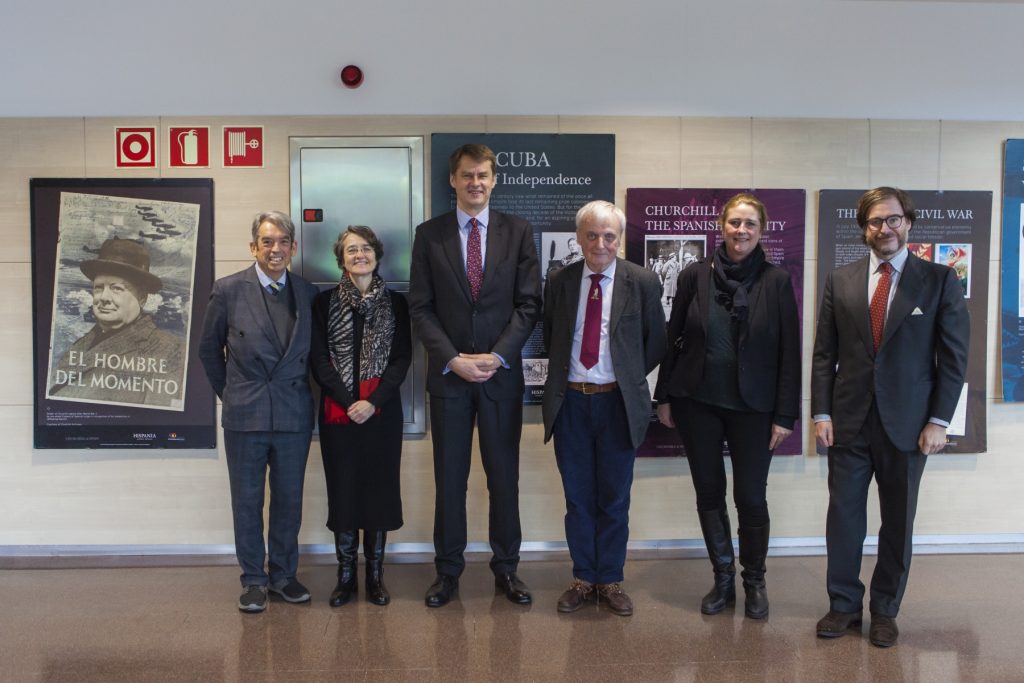
You are an Anglo-Spanish author & journalist and you are keeping a “London Diary”. Could you tell us a bit more of any writing you are working on at the moment?
I find writing is not just a calling, but a form of therapy, and keeping a diary helps me be aware, reflect, discern, and where necessary interpret and respond in challenging times. . One of the persons that has had an enduring influence on me is the memory and example of my late Spanish grandfather Dr Gregorio Marañon who had a great faith in mankind. I do recommend those who have not seen it yet the wonderful documentary that TVE produced on his exemplary life. I remember showing it at a joint panel event of the BritishSpanish Society and Instituto Cervantes in London a few years ago but it was shown recently shown by TVE 2 as part of their ‘Quedate en Casa’ campaign during the COVID19 crisis and can be found on this link.
I am also trying to use the time at home to pursue some unfinished new book projects including a biography of a friend of my father who was a spy in WW2 , and a novel about the Spanish Civil War in a small fishing village, and am planting some salad and spinach seeds in our patio garden because writing is part of living as well as survival.
CONVERSACIONES HISPANO-BRITÁNICAS – Jorge de Juan: “El Cervantes Theatre quiere ser parte de este nuevo renacimiento que ha de llegar”

Esta semana comenzamos una serie de entrevistas a personajes del ámbito hispano-británico. Nuestro primer invitado es Jorge de Juan, fundador y director artístico del Cervantes Theatre, quien nos contará los inicios del teatro, cómo repercute la crisis del COVID-19 en su trabajo y sus planes de futuro.
Jorge de Juan (Cartagena, 1961), actor, productor y director de cine y teatro español, se formó en la Real Escuela de Arte Dramático de Madrid y en la Asociación Británica de Teatro. Ha dirigido obras como The Public and The Grain Store (Fourth Monkey); End of the Rainbow; Dracula; The 39 Steps The Woman in Black; Bodas de Sangre, The Judge of the Divorces… and others, The House of Bernarda Alba and Yerma (STC).
Como actor, ha aparecido en más de 20 obras de teatro, 30 películas y series de televisión. Ha ganado el Premio Francisco Rabal por su papel en El Mejor de los Tiempos (1990), el Premio de Teatro Turia por su trabajo en La Mujer de Negro (1998) y su película Bala Perdida, ganó el premio a la mejor película y banda sonora en los premios Mostra de Valencia del Cine.
De Juan también fundó y abrió el Cervantes Theatre en noviembre de 2016. Es una creación de la Spanish Theatre Company (STC), una charity (organización benéfica) británica. El teatro presenta una combinación de producciones de la STC y actuaciones de obras españolas y latinoamericanas de otras compañías de teatro. Desde el Instituto de Cervantes de Londres y Acción Cultural Española (AC/E) apoyamos activamente la labor y el trabajo del Cervantes Theatre en Londres.
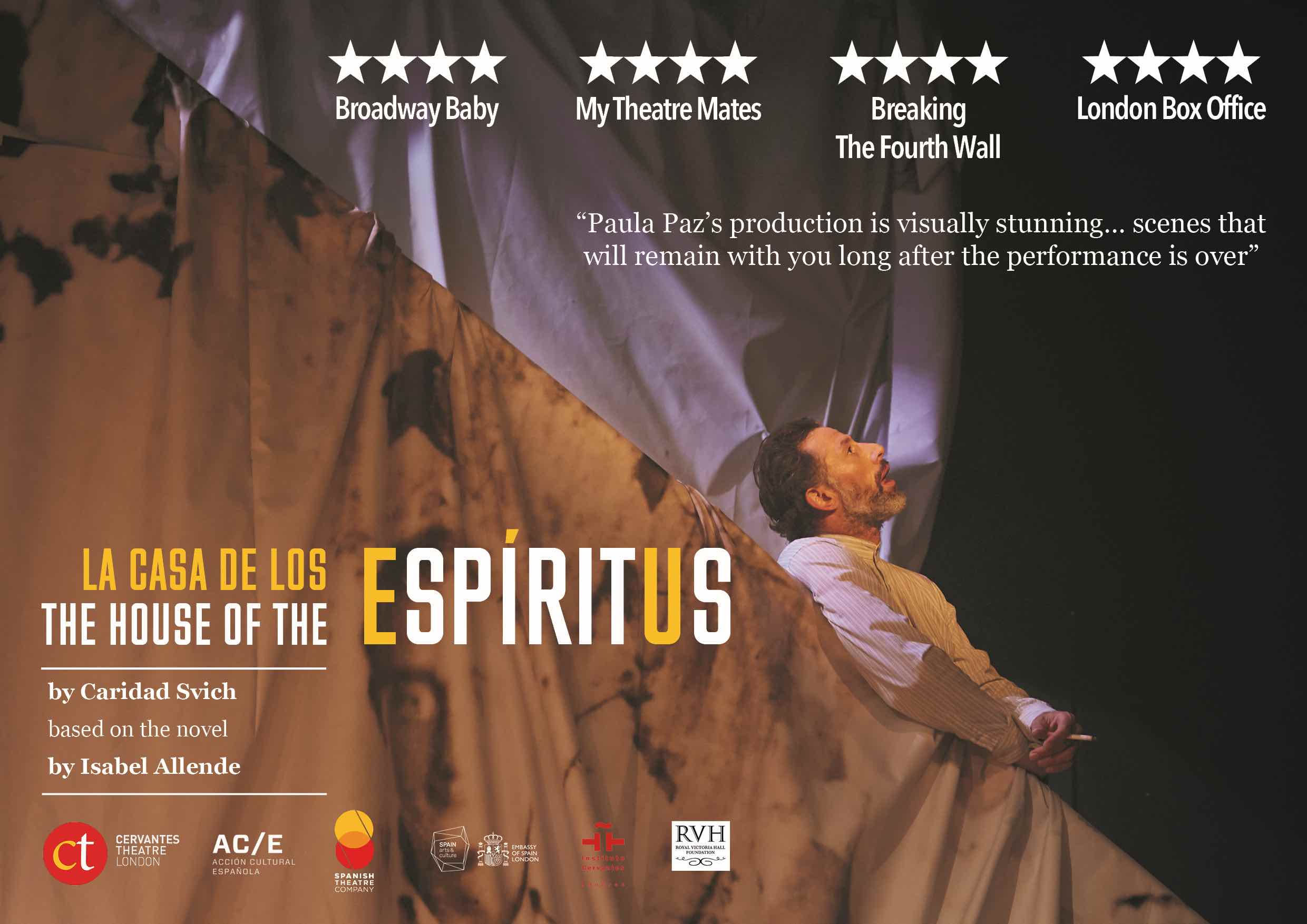
¿Cuáles fueron sus inicios del teatro? ¿Por qué eligió Londres?
Yo estudié teatro en Londres con 19 años. Estuve a punto de quedarme en la Royal Shakespeare Company, pero José Luis Gómez me llamó para su Edipo Rey y luego llegó Jaime Chávarri con sus Bicicletas son para el verano y regresé y me quedé en España. Mi maestro y amigo, Jorge Eines, me dijo que tenía una deuda pendiente con Londres y aquí estoy; aproveché que mandé a mi hija a estudiar aquí con 15 años y me vine para estar más cerca de ella. Junto con Paula Paz creamos la Spanish Theatre Company y empezamos a hacer Lecturas Dramatizadas en diferentes teatros. Más tarde el Council de Southwark nos puso en contacto con Network Rail por una nueva iniciativa que estaban planificando en Union Street y nos metimos en la locura de construir, sin dinero, el primer teatro de habla hispana en la historia del teatro británico y lo conseguimos, pero eso es una historia muy larga…
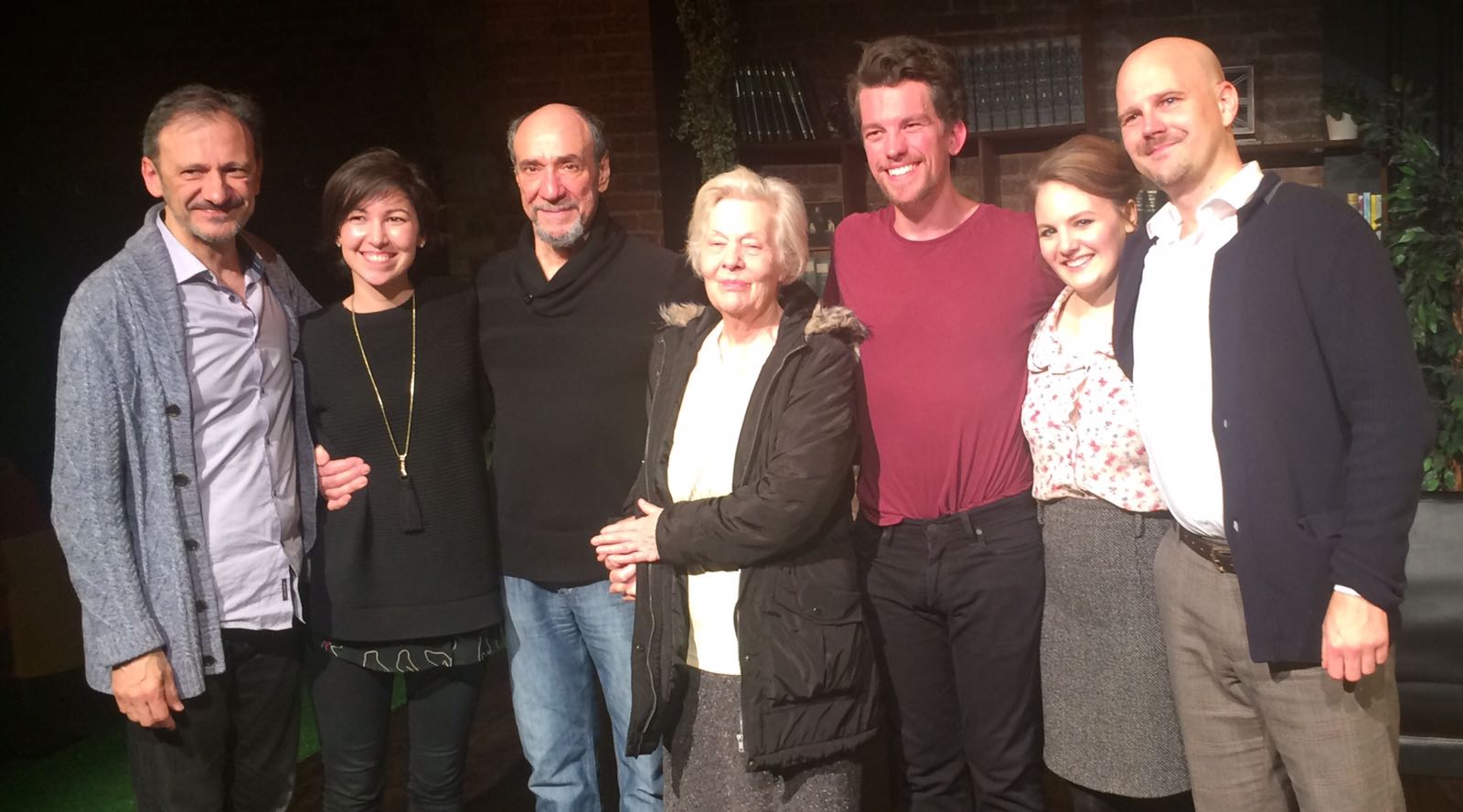
¿Qué momento hermoso recuerda de esta andadura?
La gente que nos ha ayudado, las caras de los espectadores cuando terminan las representaciones; colegios que vienen desde Bruselas a ver La casa de Bernarda Alba y se vuelven en el mismo día, o vuelan desde Belfast! Una mujer mayor, tras ver Yerma, llorando me dijo: «Llevo 27 años viviendo en Londres y poder vivir lo que he vivido hoy aquí con Lorca, en mi idioma, no tengo palabras, estoy realmente emocionada, por favor seguid así, ¡no desfallezcáis!”
Los alumnos con diferentes profesiones que quieren hacer teatro y que ves que les cambias la vida. Las personas que se han conocido y se han relacionado gracias a nuestras obras y nuestro teatro; la inmensa familia que se ha creado, es emocionante.
¿Cómo afecta el COVID-19 al Cervantes Theatre?
Hemos cerrado el teatro, cancelado la gira, nos hemos ido a casa y los planes que teníamos se han congelado, como es lógico, las posibles ayudas que creíamos que íbamos a tener este año desde España están en el aire junto al virus y el futuro es muy incierto. Sólo tenemos recursos para pagar dos meses el alquiler del teatro y puede que dejemos de existir. Vamos a hacer todo lo que esté en nuestras manos pero hay mucha incertidumbre.
De cualquier manera no dejo de pensar que hay mucha gente que va a perder sus trabajos, que no van a tener ni para comer, compañeros que van a sufrir un cambio radical en sus vidas, no somos los únicos y hemos de ser solidarios con todo lo que nos rodea, sólo con solidaridad se podrá salir de este golpe tan brutal e inesperado a las raíces mismas de nuestra sociedad.
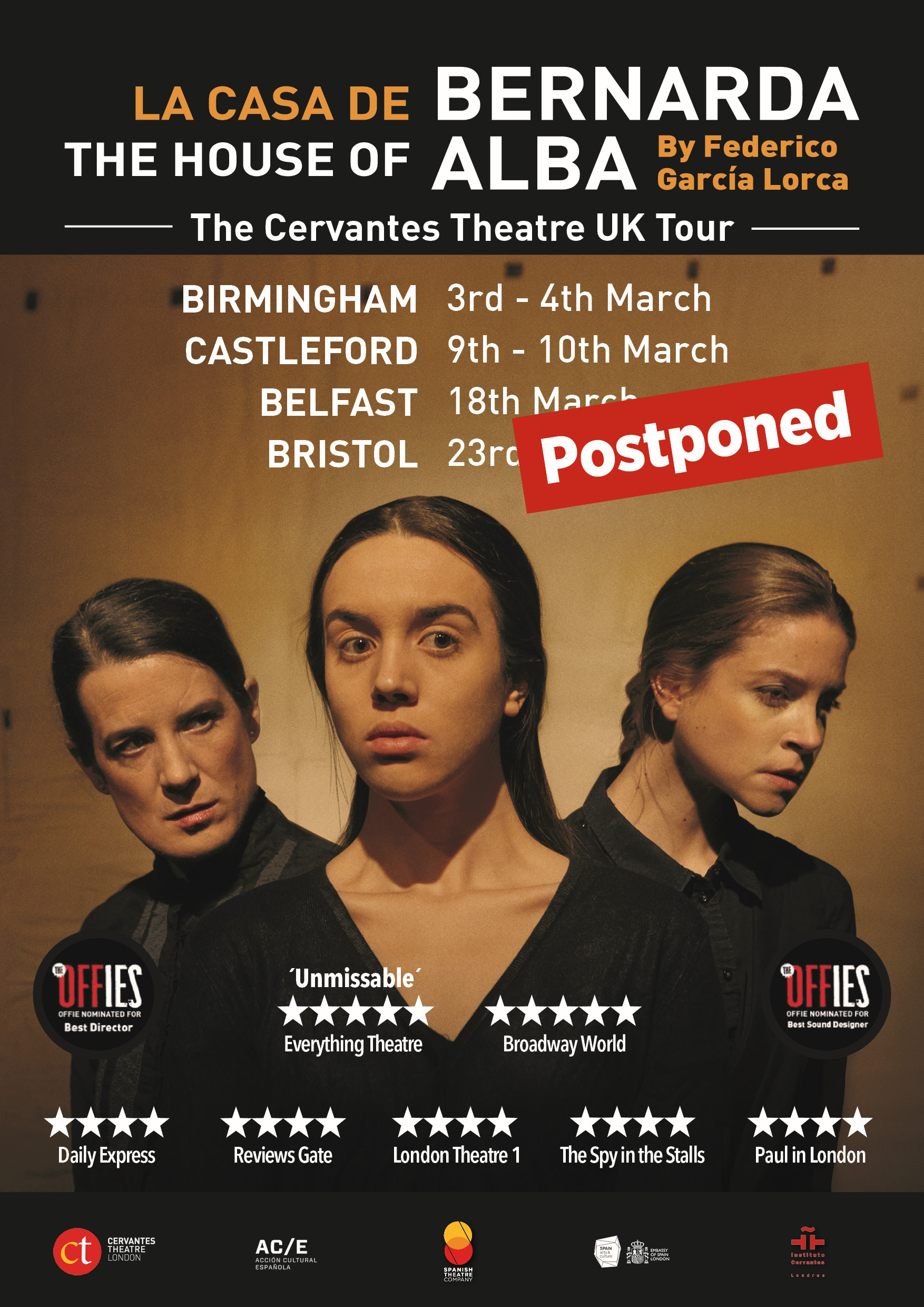
Además, han tenido que cancelar la gira de La Casa de Bernarda Alba. ¿Qué dió tiempo a hacer? ¿Con qué se queda de esa gira?
Pudimos hacer Birmingham y Leeds. Nos quedaba Belfast y Bristol y estábamos en conversaciones con otros lugares ante el éxito que estábamos teniendo.
Fue espectacular ver los teatros llenos de estudiantes, de la comunidad española y de británicos amantes de la cultura española, escuchando a Lorca y reaccionando ante esta obra de una manera que me sorprendió.
Me quedo con una frase que dijeron en Leeds: “¡Gracias por venir donde nunca viene nadie con obras como esta y tener la oportunidad de disfrutarla; por favor, volved!»
El Cervantes Theatre opera como una organización benéfica, ¿qué pueden hacer los amantes del teatro en estos momentos para ayudarles?
Ahora mismo estamos pidiendo toda la ayuda que sea posible para resistir hasta que podamos volver a abrir. Ya hay algunas personas que están reaccionando, hemos recibido alguna donación y también se han dado de alta en nuestra sistema de Amigos del Teatro. No tengo palabras para agradecerlo, me conmueve saber que somos importantes para algunas personas y es por ellas y por todo el mundo que valora lo que hacemos, que seguimos con fuerzas para seguir luchando contra el virus y contra las carencias. Cualquier persona que quiera contribuir lo puede hacer a través de nuestra web www.cervantestheatre.com.
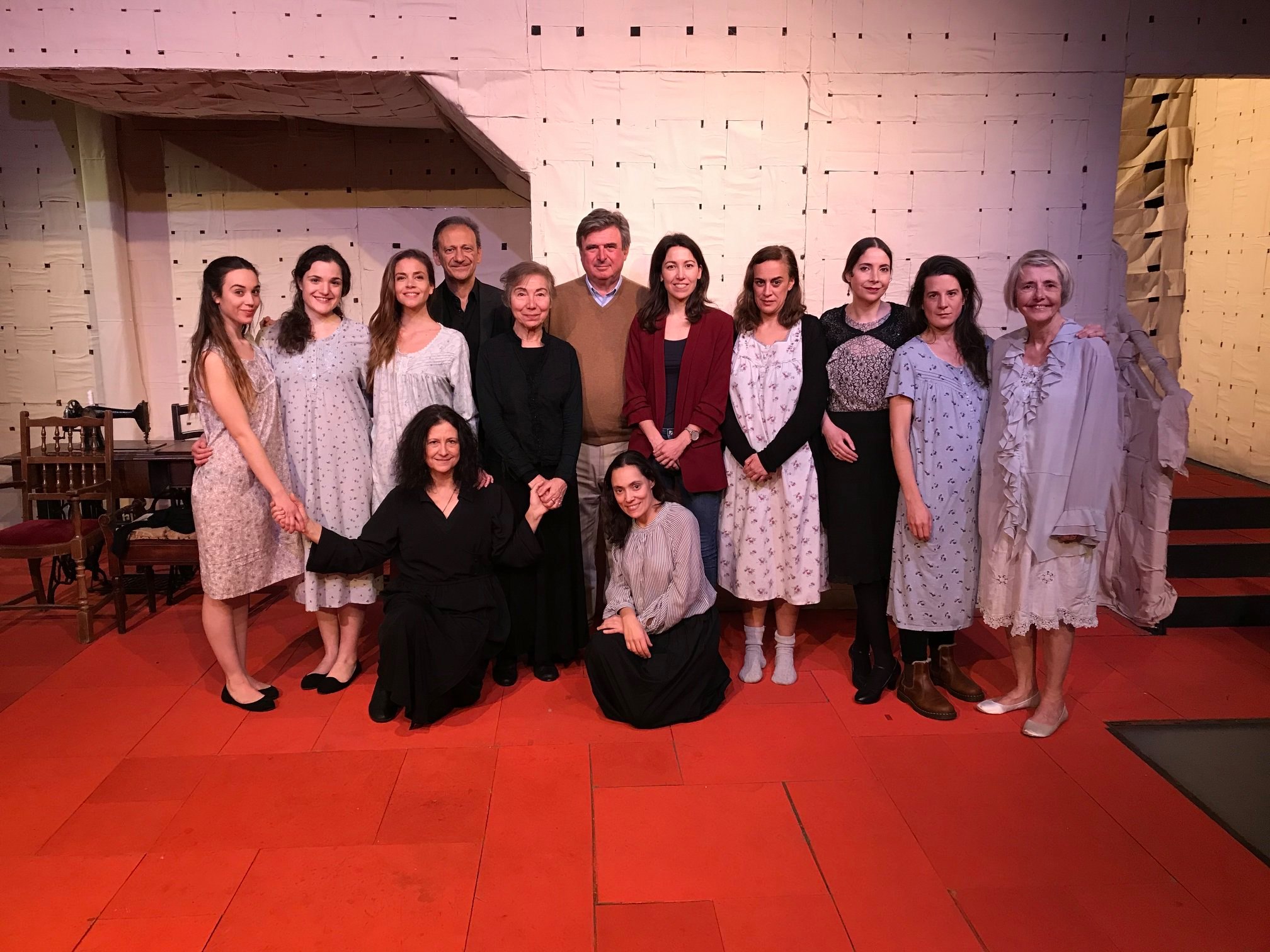
¿Qué programación esperan poder hacer el resto del año?
Teníamos planificado dedicar el año a las Spanish Golden Ages 1530-2020, hacer un recorrido por la creatividad española desde el Siglo de Oro hasta nuestros días. Era un programa que iba a durar dos años (en Noviembre del año que viene se cumplirían cinco años desde que abrimos el teatro) pero, como te puedes imaginar, ahora está en el aire. Íbamos a hacer teatro, poesía, música pero ahora, sinceramente, no sé…
¿Por qué considera que es tan importante la labor del Cervantes Theatre?
Creo que no debo ser yo quien responda a esta pregunta. Habíamos triplicado las cifras de audiencia en estos tres años y medio que llevábamos abiertos. Todo iba muy bien y la repercusión que estábamos teniendo, pese a los pocos recursos con los que contábamos, era espectacular.
Y habría que pensar en que cuando volvamos a la «normalidad», nuestro país se va a enfrentar a un reto económico y social sin precedentes, habrá que tomar medidas muy importantes internamente pero también externamente y nosotros humildemente podemos ayudar, con nuestro espacio, a comunicar esa «normalidad» en un país como el Reino Unido con tantos vínculos económicos y culturales con España y en una ciudad como Londres.
Cultura, Industria, Turismo y Exteriores deberían ser nuestros interlocutores cuando haya que poner en marcha de nuevo la maquinaria… Queremos ser parte de este nuevo renacimiento que ha de llegar y esperamos serlo.
HISPANIC-BRITISH CONVERSATIONS – Jorge de Juan: «Cervantes Theatre wants to be part of the rebirth that is to come and we hope to be»

This week we begin a series of interviews with personalities from the Spanish-British sphere. Our first guest, Jorge de Juan, is the founder and artistic director at Cervantes Theatre. He will tell us about the beginnings of the theatre, how the crisis of COVID-19 affects his work and also, his plans for the future.
Jorge de Juan (Cartagena, 1961) is a renowned Spanish producer, director, and actor. He trained at the Royal School of Dramatic Art in Madrid as well as the British Theatre Association. Directing credits include: The Public and The Grain Store (Fourth Monkey); End of the Rainbow; Dracula; The 39 Steps The Woman in Black (Spanish production); Blood Wedding, The Judge of the Divorces… and others, The House of Bernarda Alba and Yerma (STC).
As an actor, he has appeared in more than 20 plays, 30 films and many TV series. In 1990 he won the Francisco Rabal Film Award for his starring role in El Mejor de los Tiempos and the Turia Theatre Award for his performance in La Mujer de Negro, 1998. As a director, his film Bala Perdida, starring David Carradine, received both Best Film and Best Soundtrack at the Mostra de Valencia Cinema awards.
De Juan also founded and opened the Cervantes Theatre in November 2016. It is the proud accomplishment of the Spanish Theatre Company (STC), a charity which brings the best Spanish and Latin American theatre to London and British audiences in order to promote the Spanish language and dramatic arts. The theatre stages a combination of STC productions and performances of Spanish and Latin American plays from other theatre companies. The Instituto de Cervantes in London and Acción Cultural Española (AC / E) actively support the work of Cervantes Theatre in London.

What were your beginnings in theatre? And why did you choose London?
I studied Theatre Arts in London when I was 19 years old. I intended to work with the Royal Shakespeare Company, but José Luis Gómez auditioned me for his staging of Oedipus Rex and subsequently, Jaime Chávarri arrived with his Bicycles are for the summer and so, I came back and stayed in Spain. My good friend and teacher, Jorge Eines, told me that I had a pending debt with London and here I am; I took advantage of the fact that I sent my daughter to study here when she was 15 years old and came to be closer to her. Together with Paula Paz, we created the Spanish Theatre Company and began to do Dramatised Readings in different theatres. Later, the Southwark Council put us in touch with Network Rail about a new scheme that they were planning in Union Street. The scheme threw us into the madness of building the first Spanish-speaking theatre in the history of British theatre and we did it – with very few resources! – but that’s a very long story …

What is the most beautiful moment you remember from this journey?
The people who helped us, the faces of the audiences at the end of performances; the schools that came from Brussels on a single day return to see The House of Bernarda Alba, or even the ones who flew in from Belfast! Once, an old woman came to me in tears after seeing Yerma and told me: «I have been living in London for 27 years and to be able to live what I have lived here today with Lorca, in my language, I have no words, I am really excited, please keep it up, do not falter !”.
Students in all different professions who want to do theatre and you see that you change their lives in realtime. People who have met and related to our plays and our theatre: the huge family that we have created is beyond exciting.
How does the COVID-19 crisis affect the Cervantes Theatre?
We have closed the theatre, cancelled the tour; we have gone home and all the plans we had are frozen. Additionally, the potential Spanish aid expected for next year is now possibly delayed because of the virus and our future is very uncertain. We only have the resources to pay the theatre’s rent for two months and, after that, we may cease to exist altogether. We will do everything we can, but there is a lot of uncertainty.
Either way, I can’t stop thinking that there are many people who are going to lose their jobs. Everyone of us will undergo a radical change in our lives – we are not alone in this and we all have to join in solidarity. Only through solidarity can we withstand this brutal and unexpected blow to the very roots of our society.

In addition, you have had to cancel the tour of La Casa de Bernarda Alba. What were you able to achieve despite the cancellation? What did you learn from the tour?
We were able to do Birmingham and Leeds tours. We were meant to proceed to Belfast and Bristol and we were also in talks with other venues to continue the tour due to the success we were having.
It was spectacular to see the theatres full of students, the Spanish community and British lovers of Spanish culture, listening to Lorca and reacting to this play in a way that surprised me.
I am left with a phrase they said in Leeds: “Thank you for coming where no one ever comes with works like this and giving us the opportunity to enjoy it; please come back!”.
Cervantes Theatre operates as a charity, what can theatre lovers do right now to help you?
Right now we are asking for as much help as possible to resist the closure. There are already some people reacting and we have received donations. Others have also registered in our Friends Scheme (Membership Scheme). I have no words to thank them but I am moved to know of our importance to people and it is for them – and for everyone who values what we do – that we continue with the strength to fight against the virus and its impact on our industry . For anyone who would like to contribute, please head to our website: www.cervantestheatre.com.

What programme do you hope to complete this year?
We had planned to dedicate the year to the «Spanish Golden Ages 1530-2020», to take a tour of Spanish creativity from the Golden Age to the present day. It was a programme that would have lasted two years (next November would have been our five year anniversary) but, as you can imagine, it’s now all in the air. We were going to continue showing theatre, poetry, music but now, honestly, I don’t know …
Why do you consider the work done by Cervantes Theatre to be so important?
I don’t think I should be the one to answer this question. But in three and a half years since we first opened, we have tripled the size of our audience. Everything was going very well and the impact we were having, despite the few resources we had, was spectacular.
Nevertheless, even when we will return to «normality», our country will face an unprecedented economic and social challenge. We will have to take very important measures internally as well as externally. With our space, in our humble way, we will continue to communicate that «normality» in a country like the United Kingdom with so many economic and cultural ties to Spain.
Culture, Industry, Tourism and Foreign Affairs should be our interlocutors when the social machinery starts up again and we want to be part of this social rebirth. This is what we hope will come and what we hope to be.
We are here for you! ¡Estamos contigo!
We all have to #StayAtHome but #InstitutoCervantesContigo keeps looking after their students, and now, more than ever, they are learning #Spanish with their teachers, using the online tools in a new and fun way.
We are here for you!
Todos tenemos que seguir el consejo #QuédateEnCasa pero #InstitutoCervantesContigo sigue cuidando a sus alumnos. Ahora, más que nunca, están aprendiendo español con sus profesores, utilizando las herramientas en línea de una manera nueva y divertida.
¡Estamos contigo!
Important notice: classroom based group lessons transferred to online mode and suspension of the cultural activity of Instituto Cervantes in the United Kingdom
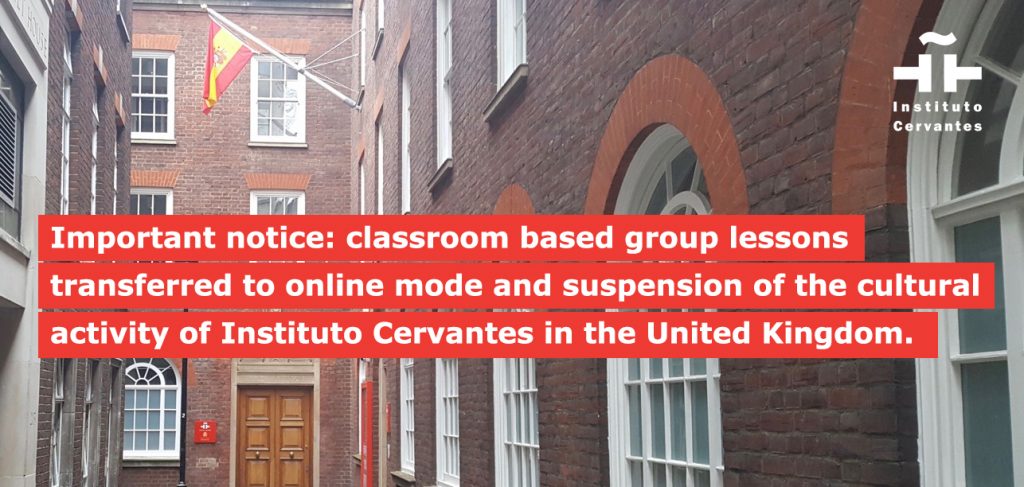
Due to the health alert caused by coronavirus COVID-19, Instituto Cervantes in the United Kingdom, following British and Spanish authorities’ guidelines, has decided, in order to protect the health of all involved, to transfer its classroom based group lessons to online platforms and to suspend its cultural programme in the centers of London, Manchester and Leeds until further notice.
Please kindly check Instituto Cervantes in Manchester and Leeds’ websites for further details and announcements.
MEASURES FOR LONDON:
Academic activity: classroom based group lessons are suspended from Tuesday, March 17th. We will start teaching our classes remotely from Friday, March 20th.
Tuesday, March 17th, Wednesday, March 18th and Thursday, March 19th there will be NO group based class of any kind and these sessions will be moved at the end the course timetable.
The teacher in charge of each group will contact their students as soon as possible to give them precise details about the implementation of the classes on line, and about the recovery of 17th, 18th, and 19th on March sessions, when applicable.
We will continue to teach our classes remotely until the end of the present term.
- The Spanish AVE Global on-line courses, as well as the rest of the Instituto Cervantes’ on-line teacher training, are still in operation.
- The CCSE exam scheduled for March 26th in London goes ahead
- DELE exams in May are suspended. Students who registered will be contacted by Instituto Cervantes to reschedule their exam to July or September.
- All the scheduled cultural activities are postponed
- Our libraries will remain closed and the deadline for returns of any borrowed items will be extended accordingly. All the services of our electronic library will remain available. You may find additional information on the YouTube channel of each center (London, Manchester, and Leeds).
Please follow us here as well as on our website and our social networks for further updates of the situation and notification of the normalization of our activities.
For any questions or additional information, you can contact us via email in London (cenlon@cervantes.es), Manchester (cenman@cervantes.es) and Leeds (cenlee@cervantes.es).
Instituto Cervantes will continue to collaborate with authorities by conveying our plans and data and following the recommendations given in order to limit the spread of the COVID-2019 coronavirus.


